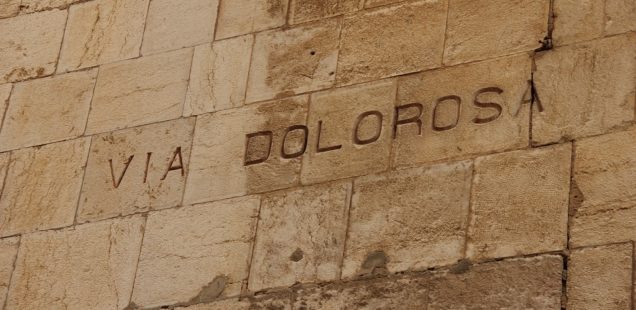
Departing the Camp
Modern Jerusalem looks nothing like the City of David in the time of Jesus. Today it is a bustling metropolis, complete with high-rise apartment buildings, sprawling suburbs, and densely-packed roadways. Yet Zion was once contained within walls. Outside the walls, at some distance from the city, small hamlets and villages dotted the gently rising hills. Orchards, vineyards, and grain fields once blanketed the surrounding regions. Several roads led into the city, and along these roads, the haughty Roman government displayed its might – for it was along these roads that criminals were crucified. Their bodies were left on crosses as a vivid reminder of Roman’s power and justice.
In this sense, those who were inside the city walls of Jerusalem were in a place of safety. Here was the venerable temple, the most sacred site for Jews. This was an ancient and fabled city, a city of kings and prophets, saints and heroes. Jerusalem was the place that every pious Jew wanted to be.
To be outside the city was the place of shame and disgrace. It was the place for condemned criminals – as well as the place for soon-to-be-condemned criminals: outside Jerusalem, robbers, bandits, and murderers lurked along the roads, waiting to prey on helpless travelers.
Jesus Outside the Camp
“So Jesus also suffered outside the gate in order to sanctify the people through his own blood.” (Hebrews 13:12)
Hebrews 13 contains an encouragement to Christians not to be ‘led away by diverse and strange teachings,’ such as which foods are clean or unclean. But, if any Hebrew Christian was interested in this question, the author provides a concession – ‘if you want to discuss foods,’ he indicates, ‘then recognize that Christians have a superior food – we have an altar to eat from, that even the priests cannot eat from.’
As the argument unfolds, Jesus is presented as the most holy sacrifice – a sacrifice similar to the yearly sacrifice of atonement. Just like that sacrifice, Jesus must be led outside the city walls to his fate, and no Jew could partake of that sacrifice. Christians, however, are able to spiritually feed on Jesus, partaking of the greatest sacrifice ever offered.
Christians Outside the Camp
“Therefore let us go to him outside the camp and bear the reproach he endured.” (Hebrews 13:13)
The profound benefit of feeding on Christ spiritually does not come about without responsibility. That responsibility, for the Christian, is to ‘go to him outside the camp and bear the reproach he endured.’
This teaching is foundational for understanding Christian worldview. The Christian does not fit into society. He seeks his place by the side of the Savior, bearing reproach. The Christian recognizes that this is not the place of ease and comfort, but it is the path of the Savior.
Society raises its eyebrows when you are outside the camp. The one who is outside the camp is not trying to fit into cosmopolitan life. He has more important things to worry about. The fashions, styles, pursuits, hobbies, and trifling entertainments of the city make no difference to the one outside the camp. It is not only that it is difficult for the Christian to fit into the world – we can’t fit in! Our culture is different than theirs. We value and honor the crucified – and resurrected – Christ. Enduring his reproach is not reproachful, but honorable to us. The world, safe within the city walls, is too sated by pleasures to notice our Lord.
The Pilgrim Life
“For here we have no lasting city, but we seek the city that is to come.” (Hebrews 13:14)
It is not unbearable to suffer outside the city, because another city is coming. Those who are snug within the city walls, safe from reproach and suffering, do not realize how precarious their position is. Their city may be teeming with people and evidently cheerful, but it is going to pass away, just as Jerusalem, only 40 years after Jesus’ crucifixion, was reduced to rubble by Roman armies.
If you read Hebrews carefully, you will immediately notice the connection between Christians and the ancient heroes of the faith. Christians ‘seek the city that is to come,’ just as Abraham ‘was looking forward to the city that has foundations, whose designer and builder is God.‘ In other words, Christians are pilgrims, who desire a better country.
Conclusion
Like every privilege, feeding on Christ spiritually involves responsibilities. A Christian’s love for the Christ should create not only an acceptance, but a willingness to follow the Messiah outside the gate. It may be a place of reproach – a place of suffering, of not ‘fitting in’ – but it is only temporary. A coming, lasting city will soon replace it.




This is excellent Daniel. I wish I would follow thru on this. Great guide to live by. Again thanks. I forwarded this to some friends.